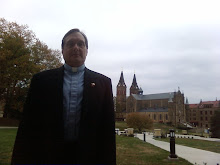
2 Sm 5:1-3

Lk 23:35-43
Thinking of kings brings to mind the idea of splendor, of glory. After all, kings live in palaces, have people wait on them hand and foot, sit on glorious thrones, and generally are surrounded by magnificent things. Certainly we think of Christ as King, especially as we celebrate this solemnity of Christ the King. The art work that portrays Christ as king shows the very splendor and glory that we associate with kings. Christ is seen in regal pose, sitting on a glorious throne. Icons of Christ the King are studded with jewels, all portraying the splendor and glory that we see as regal, kingly.
What a contrast to the Gospel reading today. Rather than a royal salon, we find ourselves on a dusty hill outside of Jerusalem. Rather than a jewel encrusted crown, we see a crown of thorns. Not a glorious throne, instead a cross. This scene isn’t exactly the royal drawing room we associate with kings. How can this person be a king? The sign over his head proclaims him king, but no one seems to see him as a king. The crowds jeer and mock him, “If you’re the King, save yourself.” He hangs on the cross, a common criminal, dying with other criminals. Even one of the criminals crucified with him jeers and mocks him. The other, however, the other sees something different. This man sees, a king. He alone seems to understand that this hill, this place, is a place of power, that this man is indeed not just a king, but the king. He sees what the others cannot, he sees what we should.
We find ourselves too often caught up in the glitz and glamour of the world. We may not have actual royalty, but we make certain people royalty. We see the trappings of wealth and power and think that they matter. We grant these wealthy, glamorous people a power that is not theirs. We see a false power, missing the point of real power. We fail to see the real power, the real glory that we should on that Jerusalem hill, for there is our salvation.
A man hangs on a cross on a dusty Jerusalem hill. Could there be a more regal setting; could there be a more glorious throne?
Thinking of kings brings to mind the idea of splendor, of glory. After all, kings live in palaces, have people wait on them hand and foot, sit on glorious thrones, and generally are surrounded by magnificent things. Certainly we think of Christ as King, especially as we celebrate this solemnity of Christ the King. The art work that portrays Christ as king shows the very splendor and glory that we associate with kings. Christ is seen in regal pose, sitting on a glorious throne. Icons of Christ the King are studded with jewels, all portraying the splendor and glory that we see as regal, kingly.
What a contrast to the Gospel reading today. Rather than a royal salon, we find ourselves on a dusty hill outside of Jerusalem. Rather than a jewel encrusted crown, we see a crown of thorns. Not a glorious throne, instead a cross. This scene isn’t exactly the royal drawing room we associate with kings. How can this person be a king? The sign over his head proclaims him king, but no one seems to see him as a king. The crowds jeer and mock him, “If you’re the King, save yourself.” He hangs on the cross, a common criminal, dying with other criminals. Even one of the criminals crucified with him jeers and mocks him. The other, however, the other sees something different. This man sees, a king. He alone seems to understand that this hill, this place, is a place of power, that this man is indeed not just a king, but the king. He sees what the others cannot, he sees what we should.
We find ourselves too often caught up in the glitz and glamour of the world. We may not have actual royalty, but we make certain people royalty. We see the trappings of wealth and power and think that they matter. We grant these wealthy, glamorous people a power that is not theirs. We see a false power, missing the point of real power. We fail to see the real power, the real glory that we should on that Jerusalem hill, for there is our salvation.
A man hangs on a cross on a dusty Jerusalem hill. Could there be a more regal setting; could there be a more glorious throne?









